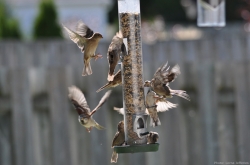Search for Resources
Description
This website explores the role of climate change in altering bird distribution and provides an overview of how NASA is using satellite imagery to map important bird areas and evaluate weather pattern changes in these regions. Students are also encouraged to become amateur birdwatchers to assist in documenting bird species and abundance in their community. Instructions are provided for making an inexpensive homemade bird feeder that students can use to start their naturalist adventure.
General Assessment
Recommendation of how and where to use it
This resource can be used to support student research into ecosystem interactions and the role of habitat in supporting animal populations. Students also have an opportunity to actively engage with nature through bird observations at their homemade feeders. A class could inventory species and numbers of birds that visit their feeders on a daily basis and provide the information to a local naturalist or bird-watching club. The site also supports curriculum about global warming and changes in weather events that may be affecting natural environments.
Relevant Curriculum Units
The following tool will allow you to explore the relevant curriculum matches for this resource. To start, select a province listed below.
- Step 1Select a province
- Alberta
- Step 2Select a grade level
- Kindergarten
- Step 3Select a subject
- Science
- Step 4Relevant matches
- Earth Systems: Understandings of the living world, Earth, and space are deepened by investigating natural systems and their interactions.
- British Columbia
- Step 2Select a grade level
- Kindergarten
- Step 3Select a subject
- Science
- Step 4Relevant matches
- Science: Daily and seasonal changes affect all living things.
- Grade 1
- Step 3Select a subject
- Science
- Step 4Relevant matches
- Science 1: Living things have features and behaviours that help them survive in their environment
- Manitoba
- Newfoundland & Labrador
- Northwest Territories
- Step 2Select a grade level
- Kindergarten
- Step 3Select a subject
- Science
- Step 4Relevant matches
- Science: Daily and seasonal changes affect all living things.
- Grade 1
- Step 3Select a subject
- Science
- Step 4Relevant matches
- Life Systems: Characteristics and Needs of Living Things
- Science 1: Living things have features and behaviours that help them survive in their environment
- Nova Scotia
- Nunavut
- Prince Edward Island
- Saskatchewan
- Yukon Territory
- Step 2Select a grade level
- Kindergarten
- Step 3Select a subject
- Science
- Step 4Relevant matches
- Science: Daily and seasonal changes affect all living things.
- Grade 1
- Step 3Select a subject
- Science
- Step 4Relevant matches
- Science 1: Living things have features and behaviours that help them survive in their environment
Themes Addressed
Air, Atmosphere & Climate (1)
- Climate Change
Ecosystems (2)
- Biodiversity
- Interdependence
Science and Technology (1)
- Alternative Ways of Doing Science

